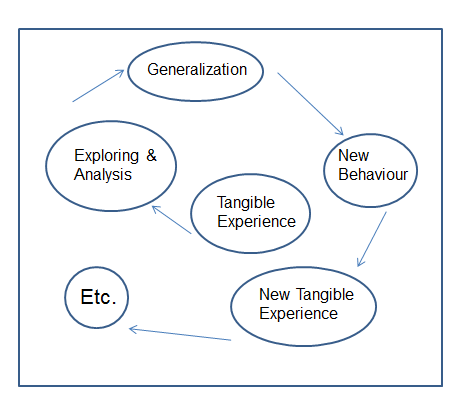Last time we watched a video. Now I want you to think about it and reflect on the purpose of that inspiring video. You can try to think about WHY, CONTEXT, ENVIRONMENT. In the video there is something about Believe. What is it all about? And tell me which is right:
- I of Dream Speech?
- I of Plan speech?
I have another small task for you. Reflect on Three things that makes me (here it refers to you) WHO I AM? Those of you who haven’t tried reflection questions. Please at this stage go back to the earlier posts and find the questions in the beginning of the posts and try to reflect on them.
Energizer: Find the ZHABA (frog) – Find in 10 minutes the most beautiful ZHABA (frog) on Internet.
This is a small exercise to refresh your mind and after finishing this start reading below. Have a nice reading session.
Lets start now on Experiential Learning. This is also the very important and basic part of Process Facilitation. It is a common observation and you all will agree that knowledge is continuously gained through both personal and environmental experiences. In Hyper Island term or as we say in Hyper Island ‘Learning By doing’. What will we get when we learn? We get an experience. In order to gain genuine knowledge from a learning experience certain abilities are required. Abilities such as:
- The learner is willing to actively involved in the experience.
- The learner is able to Reflect on the experience.
- The learner have and use analytic skills to conceptualize the experience; and
- The learner has and uses decision-making and problem solving skills in order to use the new ideas gained from the experience.
Let me show you a visual chat of Experiential Learning and it will make a lot more sense :).
Process Facilitation Basics – Learning Spiral or Experiential Learning
Experiential Learning is sometimes refers to Learning Spiral. This model for the learning process is composed of four elements and is known as Learning Spiral.
- Tangible Experience
- Observation, exploring and analyzing the new experience
- Generalization, forming of abstract concepts based upon the reflection and
- New Behavior
What follows is the new tangible experience, thus the process continues.
Tangible Experiences are those experiences which you learn by doing. So keep in mind any experience and than explore and analyze that experience by using your observational skills. You will be amazed from the results. After observation comes Generalization which is forming of abstract concepts based upon your reflection. Reflection is coming in the next post and after that you will be able to reflect in much better way. At this stage just remember that reflection is connected with observation, exploration and analyzing the experiences. In the end you get a new Behavior which is a new Tangible experience and the circle goes on.
I would love to hear your examples on the learning experiences. Comment them in the comment section below. And let’s have a discussion on our experiences.
I have tried to simplify this Blog post so that new or old can easily understand and can practice. If you want to read more than you can do that by simply search Kolb experiential Learning. The model you see above is a simplified form of the original model by Kolb.
Next is Reflection a very important concept.. It will be short text description. I will see if I can add a task so that you can do the task and practice your reflection technique. And for now subscribe to my blog so that you don’t miss out the posts.
//Imran

